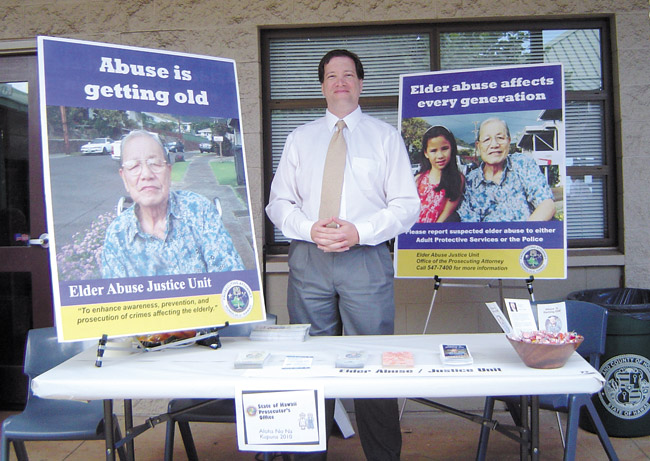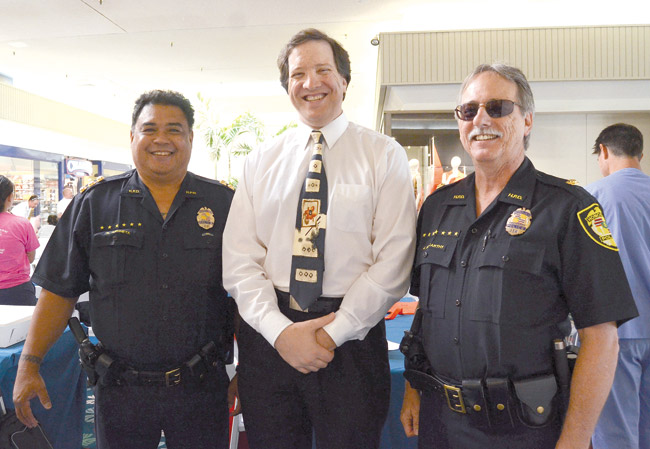Stopping The Elder Scams
Elder abuse can take many forms, but the most common involve finances. Scott Spallina of the City Prosecutor’s Elder Abuse Justice Unit is out to stop it
Take a moment to think about your children, grandchildren or even your nieces and nephews.
Think about what you would do so they never would have another financial worry for the rest of their lives. What would that mean for you, to know you had left something bigger than you, a legacy?
mw-nm-011415-elderabuse-3
Would that be your proudest accomplishment? Would that be something to risk everything for, something to even stretch far beyond the boundaries of the common sense that has governed your whole life?
If your answer to this is “no,” then you probably do not have children, because that instinct is born in you as your child is born into the world, and it is this desire at our core which has allowed the fleecing of our seniors to prevail in today’s world.
Elder abuse can come in many forms, but the one that is running rampant through our society yet remains widely unreported is financial scams that prey on their instinct to care for their brood.
“As a parent or grandparent, your No. 1 priority is to take care of your family even after you are gone,” says Scott Spallina, head of the Office of the Prosecuting Attorney Elder Abuse Justice Unit. “They want to give them a legacy, a house, because it is so expensive to live here, or to give their grandchild a college education, something they did not have. So their motivation is good.”
In the six years since Spallina started the unit at the behest of then-Prosecutor Peter Carlisle, they have seen a 294 percent increase in cases of elderly abuse, and yet they know that so many more cases are going unreported.
“You are a father, had a respectable job, then you get taken for $10,000, $100,000. Are you going to tell your children that you got taken, ‘declare me incompetent and just give me an allowance’?” says Spallina.
It is this shame factor that keeps elders quiet, and Spallina has made it his mission to inform the senior community of the dangers that abound.
One example he cites happened to a local lady, who received a letter in the mail outlining how she had just won a $22 million lottery. Enclosed was a credit card with her name embossed on it and the requisite magnetic strip that she could use to access her winnings. All she needed to do was send a $200 check to pay for the activation fee and the winnings would be hers. It seemed like a small amount to wager for a gigantic payoff, so she did. They warned her not to tell anyone of her winnings, that there are lots of scam artists who will try to get their hands on her good fortune.
Soon thereafter, another letter came apologizing, but needing $500 more for some international fees to activate the card.
Then another. And another.
The threat to our seniors does not just come from outside forces — more than 70 percent of the abusers are related to their victim. These abuses can range from physical and sexual assaults to financial scams where parents are coerced into signing away assets or even their own homes.
In all, she sent off 60 checks totaling tens of thousands of dollars, burning through her husband’s retirement funds and the money they had set aside for their children, squandering their inheritance trying to secure them a bigger one. She described it being like a slot machine, that the next check was going to be the one when she would finally hit the jackpot.
This is not an isolated incident, and Spallina has young people ask him all the time how to make their parents stop giving away their money — a question to which Spallina unfortunately does not have an answer.
“In every other aspect of his life, he is as sane as you or me, he is competent, so for us to say he is incompetent, let’s take away all his rights, is crazy,” says Spallina. “They were working their whole lives to make this money and now, they cannot have access to it? The answer cannot be declaring them incompetent, that is ridiculous.”
The elderly make an obvious target with their desire to provide and the fact that they make up a majority of homeowners and control 70 percent of the wealth, but scammers do not differentiate, preying on the poor as well as the rich, as Spallina saw recently in a Kuhio Park Terrace household.
“This mother was sending off her welfare checks each month, and when the police arrived to investigate, she went and put on her best dress because she believed they were there to escort the governor, who was bringing her a new car and $20,000,” remembers Spallina.
Investigating these crimes was the reason behind forming this unit, but it has been the out-reach and educational arm of his job that is providing Spallina the most satisfaction. He speaks at senior centers, health fairs, radio shows and anywhere people will listen to him about how to protect themselves from these diabolical criminals.
The first tip he has for the elderly:
“Move to a small island and hide.”
But if that is not possible, he continues, after the chuckles have subsided, simply realize you are not that lucky, Nigerian princes are not really reaching out to you, and if something sounds too good to be true, it is.
He found this to be true even in his own home, when his mother-in-law was seeking help for his stroke-stricken father-in-law. She had found the perfect caregiver for him, a heart surgeon who was a Christian and looking to eventually open a care home — and the best part was she only wanted $10 an hour to care for him.
A dream solution, right? But a dream was all it was, as the woman would use this resume, which she had posted on craigslist, to find her way into homes, fake an accident and then sue the family. Spallina was fortunate to be in the position to smell out such a scam, but he knows there are so many people who are too kind to think they could be taken advantage of in this way.
“I tell them to learn from me, learn to be Mainland rude,” says Spallina, only half-kidding. “You have to learn to shut the door when someone knocks and says, ‘Can I do this for you?’ These people rely on local people’s politeness to wear them down. We need to just hang up or say no, no, no.”
To report suspected elder abuse, request a presentation by Spallina or just for more information, go to elderjusticehonolulu.com or call 832-5115.







